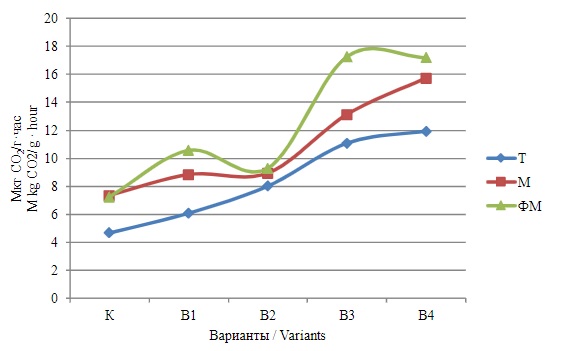Study of the possibility of using sewage sludge for biological reclamation of oil-contaminated gray forest soils
DOI:
https://doi.org/10.24852/2411-7374.2023.2.63.69Keywords:
wastewater sludge, soil, petroleum hydrocarbons, microbial respiration, recultivationAbstract
The effect of thermomechanically treated granular urban sewage sludge on the respiratory activity of recultivated oil-contaminated gray forest medium loamy soil was studied in laboratory conditions. The main characteristics of granular sewage sludge, information on the effect of the content of petroleum products on the rate of basal and substrate-induced respiration, the values of the microbial respiration coefficient of soil samples incubated with or without granulate are presented. Data on the effect of plant cultivation on the efficiency of pollutant destruction and the biochemical activity of the soil containing granulate sewage sludge are presented. It has been established that the introduction of granular sediment at the rate of 10 t/ha into soils containing 2.7, 6.1, 14.4 and 19.7 g/kg of petroleum products leads to the intensification of oxidative processes, reduces the toxic effect, and increases the resistance of soil microbiocenosis to pollutants. In the presence of granulate at a concentration of oil products of 6.1–19.7 g/kg, the efficiency of their destruction is 1.7–2.5 times higher than without it, which confirms the promise of using sewage sludge for the recultivation of oil-contaminated soils.
References
Anchugova E.M., Melexina E.N., Markarova M.Yu., Shemelinina T.N. Podxody k ocenke metodov rekul`tivacii neftezagryaznennyx pochv [Approaches to evaluating methods for remediation of oil-contaminated soils] // Pochvovedenie [Soil science]. 2016. No 2. Р. 257–260. doi: 10.7868/S0032180X16020027.
Blagodatskaya E.V., Anan`eva N.D. Ocenka ustojchivosti mikrobny`x soobshhestv v processe razlozheniya pollyutantov v pochve [Assessment of microbial community resilience in the decomposition of pollutants in soil] // Pochvovedenie [Soil science]. 1996. No 11. Р. 1341–1346.
Vershinin A.A., Petrov A.M., Ignat`ev Yu.A., Shagidullin R.R. Dy`xatel`naya aktivnost` dernovo-karbonatnoj pochvy, zagryaznennoj dizel`nym toplivom [Respiratory activity of sod-carbonate soil contaminated with diesel fuel] // Vestnik Kazanskogo texnologicheskogo universiteta [Annals of Kazan technological university]. 2011. No 7. Р. 168–174.
Vershinin A.A., Petrov A.M., Knyazev I.V. Izmenenie soderzhaniya ugleroda mikrobnoj biomassy` v usloviyax dlitel`nogo neftyanogo zagryazneniya temno-seroj lesnoj pochvy` [Changes in the carbon content of microbial biomass under conditions of long-term oil contamination of dark gray forest soil] // Materialy` Mezhdunarodnoj nauchno-prakticheskoj konferencii «Ustojchivoe razvitie regionov: opyt, problemy, perspektivy». Kazan: AN RT, 2017. P. 234–237.
Vershinina I.A., Lebedev S.V., Galaktionova L.V. Sovremennye podxody k vosstanovleniyu zagryaznenny`x pochv [Modern approaches to remediation of contaminated soils] // Voprosy sovremennoj nauki. Moscow: Internauka, 2021. Vol. 68. P. 9–31. doi: 10.32743/25001949.2021.68.313842.
Gilyazov M.Yu., Gajsin I.A. Agroekologicheskaya xarakteristika i priemy rekul`tivacii neftezagryaznenny`x chernozemov Respubliki Tatarstan [Agroecological characteristics and reclamation methods for oil contaminated chernozems in the Republic of Tatarstan]. Kazan`: Fen, 2003. 228 p.
GOST R 59057–2020. Okhrana okruzhayushhej sredy`. Zemli. Obshhie trebovaniya po rekul`tivaczii narushenny`kh zemel`[ Environmental protection. Earth. General requirements for the reclamation of disturbed lands].
GOST R ISO 22033–2009. Kachestvo pochvy. Biologicheskie metody. Xronicheskaya toksichnost` v otnoshenii vy`sshix rastenij. [Soil Quality. Biological Methods. Chronic toxicity to higher plants].
Kireeva N.A., Vodop`yanov V.V., Miftaxov A.M. Biologicheskaya aktivnost` neftezagryaznennyx pochv [Biological activity of oil polluted soils]. Ufa: Gilem, 2001. 376 p.
Nikitin D.A., Semenov T.I., Chernov N.A., Ksenofontova N.A., Zheleznova A.D., Ivanova E.A., Xitrov N.B., Stepanov A.L. Mikrobiologicheskie idikatory ekologicheskix funkcij pochv (Obzor) [Microbiological indicators of ecological functions of soils (Review)] // Pochvovedenie [Soil science]. 2022. No 2. P. 228–243. doi: 10.31857/S0032180X22020095.
Petrov A.M., Vershinin A.A., Karimullin L.K., Akajkin D.V., Tarasov O.Yu. Dinamika e`kologo-biologicheskix xarakteristik dernovo-podzolistyx pochv v usloviyax dlitel`nogo vozdejstviya neftyanogo zagryazneniya [Dynamics of ecologo-biological characteristics of sod-podzolic soils under prolonged exposure to oil pollution] // Pochvovedenie [Soil science]. 2016. No 7. P. 848–856. doi: 10.7868/S0032180X16050130.
PND F 16.1.2.2.22–98. Metodika vypolneniya izmerenij massovoj doli nefteproduktov v mineral`ny`x, organogenny`x, organo-mineral`ny`x pochvax i donnyx otlozheniyax metodom IK-spektrometrii [Methods for measuring the mass fraction of petroleum products in mineral, organogenic, organo-mineral soils and bottom sediments by infrared spectrometry].
Utombaeva A.A., Zajnulgabidinov E.R., Kuzneсsova T.V., Petrov A.M. Skrining rastenij dlya fitoremediacii neftezagryaznenny`x pochv [Screening of plants for phytoremediation of oil contaminated soils // Rossijskij zhurnal prikladnoj e`kologii [Russian jornal of applied ecology]. 2022. No 1. P. 68–75. doi: https://doi.org/10.24852/2411-7374.2022.1.68.75.
Utombaeva A.A., Petrov A.M., Zajnulgabidinov E.R., Kuzneczova T.V., Vershinin A.A., Ivanov D.V., Shagidullin R.R. Vliyanie granulyata osadka stochny`x vod na xarakteristiki seroj lesnoj pochvy i produktivnost` rastenij [Effect of sewage sludge granulate on gray forest soil characteristics and plant productivity] // Rossijskij zhurnal prikladnoj ekologii [Russian jornal of applied ecology]. 2023. No 1. P. 52–60. doi:10.24852/2411-7374.2023.1.52.60.
Ekologicheskij sertifikat sootvetstviya №RA.RU.11NA15.P.00114 «Udobrenie organicheskoe granulirovannoe na osnove osadkov stochnyh vod, izgotavlivayemoye serijno po TU 37.00.20-001-03317648-2022 na ochistnyh sooruzheniyah kanalizacii g. Kazani» [Organic granulated fertilizer based on sewage sludge, serially produced according to TU 37.00.20-001-03317648-2022 at sewage treatment facilities in Kazan].
Alotaibi F., Hijri M., St-Arnaud M. Overview of approaches to improve rhizoremediation of petroleum hydrocarbon-contaminated soils // Applied microbiology. 2021. Vol. 1, No 2. P. 329–351. doi: 10.3390/applmicrobiol1020023.
Zhang, X., Xu. D., Zhu. C., Lundaa. T., Scherr. K.E. Isolation and identification of biosurfactant producing and crude oil degrading Pseudomonas aeruginosa strains // Chemical engineering journal. 2012. Vol. 209. P. 138–146. doi: 10.1016/j.cej.2012.07.110

Downloads
Published
How to Cite
Issue
Section
License

This work is licensed under a Creative Commons Attribution-NonCommercial 4.0 International License.




